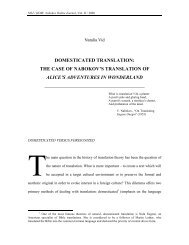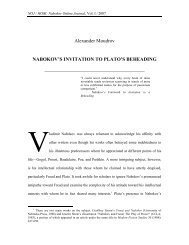Create successful ePaper yourself
Turn your PDF publications into a flip-book with our unique Google optimized e-Paper software.
Nabokov Online Journal, Vol. V (2011)<br />
_______________________________________________________________________<br />
The reader, however, tempted to seek out the “moral apotheosis” hinted at by the<br />
unreliable fictional editor John Ray, Jr. in his preface to Humbert’s memoir (Lolita 5), or<br />
even tempted to believe such a thing possible, risks being branded unnuanced and naïve.<br />
One is frequently reminded in the critical literature that in Nabokov nothing is as it<br />
appears; scholars warn against trusting in Humbert’s desire to transcend his own egoism,<br />
to repent of his criminal use of his stepdaughter. 11 It seems, however, that in arguing that<br />
H. H. remains until the very end exactly what he appears to be, i.e., a narcissistic<br />
pedophile, these scholars trip upon the very fallacy they warn against, because if nothing<br />
is as it seems on the surface in Nabokov, then this premise should also hold with regard<br />
to Humbert. And so despite my familiarity with Goethe’s Faust, or perhaps because of it,<br />
I choose to believe Humbert when he describes his revelation as he stands listening to the<br />
voices of children at play: “[T]hen I knew that the hopelessly poignant thing was not<br />
Lolita’s absence from my side, but the absence of her voice from that concord” (308).<br />
Here Humbert not only finally realizes that he has destroyed Lolita’s childhood – which<br />
destruction, it could be argued, he has sensed all along – but also shows himself capable<br />
of putting her tragedy before his own, a feat hitherto, till this very end of the narrative,<br />
beyond his abilities. Supporting my contention that here Humbert is capable, however<br />
momentarily, of transcending his limitations is the fact that in this passage he can at last<br />
apprehend the world through hearing, in contrast to vision, the sense that has been<br />
throughout the narrative associated with Humbert’s sexual pathology (“I was to her not a<br />
boy friend, not a glamour man, not a pal, not even a person at all, but just two eyes and a<br />
foot of engorged brawn,” 283). 12 This “moral apotheosis” afforded Humbert at the end of<br />
the novel immediately follows, and is a consequence of, his realization that his prior<br />
claims to the status of artist were unsubstantiated, that his perception of the object of his<br />
desire has been lacking in imagination and originality (she is much more than what his<br />
limited vision allowed her to be), as has his understanding of his own feelings for her –<br />
11 Skeptics include Harold Bloom, for whom Humbert’s transformation is simply unpersuasive; Sarah<br />
Herbold, who maintains that a Humbertian turn to morality would have precluded the commission of<br />
murder; Duncan White, who believes Humbert writes in bad faith, deluding himself that he has repented his<br />
criminal desire; and, in accord with White’s view, Leona Toker, who notes that, even after the purported<br />
recognition of his wrongdoing, Humbert is still comfortably writing in his memoir about his pedophilic<br />
bliss.<br />
12 The centrality of the scopic drive to Humbert’s behavior is discussed by Maurice Couturier in<br />
“Narcissism and Demand in Lolita” (24).<br />
7

















